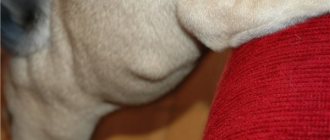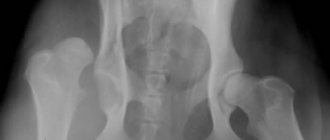Causes
Many factors can cause stomach contractions to slow or stop (impaired motility). Problems with the stomach and its ability to contract are rarely the true cause of stasis, but they also cannot be ruled out. Young animals rarely encounter such problems
Signs and symptoms of stasis are usually manifestations of other diseases that stop the stomach from working. These include:
- Stomach ulcer
- Stomach cancer
- Reaction to drug use
- Stress, pain or injury
- Stomach or intestinal infections (gastritis, enteritis)
- Blockage or obstruction of the stomach or intestines
- Surgery to the intestines or stomach
- Metabolic disorders (anemia, hypothyroidism, acidosis)
- Bloating and cramping in the stomach (gastrectasia - volvulus or intestinal obstruction)
- Enlarged esophagus (megaesophagus)
Causes of illness
Gastrointestinal disorders in pets occur for various reasons, but most often diarrhea occurs due to errors in the dog’s diet. The most common causes of digestive dysfunction are:
- Binge eating. In the wild, it’s not every day that a family of canines manages to catch their prey, but when the hunt is successful, the animals eat to their heart’s content. Domestic dogs also do not know a sense of proportion and, having grabbed a large amount of food, tend to eat in reserve.
- Incorrectly formulated diet.
- Acute gastric dilatation in dogs.
- A sudden change of food, for example, from dry to natural and vice versa.
- Poisoning with medications, poisons.
- Gastric ulcers in dogs.
- Intoxication caused by eating spoiled food.
- Helminthiasis.
- Indigestion.
- Bacterial and viral infections, including those that are life-threatening for your pet.
- Foreign body in the dog's stomach. When swallowing any inedible object, the mucous membranes of the stomach and intestines are severely injured.
- Intestinal dysbiosis.
- Allergy.
- Gastric volvulus in dogs.
- Cancerous tumors in the gastrointestinal tract. A seemingly harmless digestive disorder such as diarrhea may indicate that your pet is developing cancer of the stomach or intestines.
- Duodenitis (inflammation of the duodenum).
Often, indigestion is observed in puppies after the animals are transferred from mother's milk to another food. For a puppy, diarrhea is considered very dangerous, since the dog’s fragile body is not yet able to fight various infections that attack young animals during diarrhea.
Diarrhea is often the result of stress. Moving to another place, a change or death of the owner, the appearance of other animals in the house - all this can provoke an upset stomach in a dog.
Diagnostics
The veterinarian will perform the necessary tests to rule out a potential cause of vomiting. These include a physical examination, complete blood count, chemical profile, urine, stool, and x-ray. If necessary, a special technique called contrasting is used. In this study, a liquid substance (barium suspension) is given orally , which appears on an x-ray. The photographs track the progress of the substance throughout the body.
If necessary, doctors can resort to special studies. , a flexible tube (endoscope) is used to examine the stomach and intestines . In this case, the animal is given anesthesia. With this device, small tissue samples (biopsy) can be collected for testing. After their analysis, serious stomach diseases such as cancer can be ruled out.
Treatment
Most animals can be helped at home with dietary changes . A low-fat, low-fiber diet with a semi-liquid or liquid consistency is usually recommended. The animal should eat often, but in small quantities. Often, when gastric motor function is impaired, changes in diet help solve the problem. In cases of severe vomiting and diarrhea, dogs are hospitalized and treated with IV fluids containing liquid medications and electrolytes. Depending on the cause of the disease, surgical treatment may be used
Drug treatment helps strengthen muscle contractions and remove blockages from the stomach of animals that have been suffering from the disease for a long time. The two main drugs used to treat stasis are metoclopramide and cisapride. Metoclopramide is administered orally 30-45 minutes before meals and has antiemetic properties. The use of the drug has reversible side effects such as behavioral changes, depression or hyperactivity.
Cisapride is also administered orally 30 minutes before meals. It stimulates motor function and has been shown to be more effective than metoclopramide. Cisapride has no side effects on the nervous system, but can cause vomiting, diarrhea and depression. The sale of this drug is limited due to side effects in humans, but veterinarians can purchase it through special pharmacies.
Other drugs that help cleanse the stomach and improve gastric motor function in dogs include: erythromycin, clarithromycin, domperidone, rantidine and nizatidine.
What you need to know about gastritis in dogs
The disease appears for several reasons, but most often it is due to prolonged use of low-quality feed.
It is important to know that gastritis in a dog can occur due to eating excessively hot or cold food.
Causes of gastritis
- ignoring nutrition rules, eating the same food or food of poor quality;
- giving food that is not suitable for the animal. It could be sugar, sausage, spices;
- infection with worms;
- allergic manifestations;
- dental disorders;
- endocrine disruptions;
- chronic illnesses;
- use of certain medications.
The disease is found more often in dogs with long hair. The first ones constantly get wool and pieces of undigested food into their stomachs. As a result, irritation occurs and inflammation develops.
Types of pathology
Gastritis in dogs occurs:
- Erosive . The disease is characterized by the appearance of ulcers on the mucous membrane. The illness can be caused by stress.
- Eosinophilic . The connective tissue thickens, and the level of eosinophils increases. Causes may include allergies and parasitic infections.
- Atrophic . The walls of the stomach become thinner. The nature of the disease has not yet been clarified. Pathology can be caused by heredity.
- Lymphoplasmacytic . Infiltration of mucous membranes and sometimes muscle tissue occurs. The reason is unknown. There is a possibility that the trigger is an immune reaction to gluten and preservatives.
- Chronic lymphocytic . The reason is hereditary predisposition.
According to the level of acidity, the disease is:
- hyperacid: acidity is increased;
- hypoacid: acidity is reduced;
- anacid: gastric secretions are not produced.
Why is gastritis dangerous?
Gastritis is dangerous because:
- there is no complete digestion of food;
- the body experiences a lack of nutrients;
- the dog becomes weaker and loses weight;
- gastritis can develop into a stomach ulcer.
Only a veterinarian in a clinical setting can refute or confirm the diagnosis.
With gastritis you may experience:
- Vomiting bile . The pancreas is irritated and cannot cope with digesting food. You should consult a doctor if vomiting, especially with bile, does not stop for more than two days.
- General malaise . At first, the dog reduces activity, and then quickly loses weight and looks exhausted.
- Stomachache . The dog may whine and roll on the floor.
- White coating on the tongue
- Temperature increase . If all the indicated signs and temperature are present, this may indicate an acute form of the disease.
Diagnostics
The veterinary clinic provides:
Based on the test results, treatment is prescribed.
Self-therapy is not acceptable! Gastritis in dogs requires an individual approach from professional veterinarians. At the initial stage, the type of illness, its acute or chronic nature, is established. The doctor determines the acidity level. Therapy for gastritis is conservative.
First aid
In acute forms of the disease, the animal’s diet should be limited. If the diagnosis is confirmed, the dog is put on a starvation diet that lasts several days. Emetics are strictly prohibited, but food masses in the stomach must be removed. After the end of the fast, you can feed the dog special decoctions mixed with raw eggs. Vegetable broths and other healthy foods in small portions are recommended.
In the acute form of the disease, the animal must be kept on a starvation diet for a couple of days, but not limit water. At this time, the stomach should be rinsed with a 1% solution of sodium chloride or a 0.01% solution of potassium permanganate. The use of Furazolidone and Furacilin when administering enemas is also indicated. Using an enema, toxic feces are removed.
Basic treatment measures
Complex therapy includes:
- gastric lavage if the disease is caused by poisoning;
- laxatives for constipation, fortifying drugs for diarrhea;
- droppers for dehydration;
- restorative drugs, as well as products that protect the gastric mucosa - De-nol, Almagel, Phosphalugel;
- antispasmodics or painkillers;
- antibiotics;
- vitamins for depletion.
Medications
If the disease is caused by the pathogen Helicobacter, then Amoxicillin and Trichopolum are used. Hepatoprotectors and drugs to reduce acidity are used. For eosinophilic gastritis, Prednisolone and immunosuppressive drugs are prescribed. Atrophic gastritis is leveled by Erythromycin, Cisapride, Metoclopramide.
If there is frequent vomiting, then medications and fluids are administered parenterally, bypassing the gastrointestinal tract. For severe gastritis, Ranitidine and other similar drugs are needed. Ringer's solution is administered by infusion injection.
Profuse vomiting and anorexia are causes of hypokalemia, in which case potassium chloride solution is indicated. If after a week the symptoms persist, then we can conclude that there is chronic gastritis, a systemic disease, or an unresolved irritating factor.
With chronic gastritis, diarrhea and vomiting lead to rapid dehydration of the body, which is very dangerous. Food and drink should be given in the same way as in the acute form of the disease. If a tumor, foreign bodies, or stenosis are detected, surgical intervention is required.
Profuse vomiting is stopped by Chlorpromazine and other antiemetics. Metoclopramide is used for:
- pyloric stenosis;
- slower gastric emptying;
- duodenogastric reflux.
Immunosuppressants are recommended if the diet is ineffective. If the pathology has an immune-dependent form, glucocorticoids are prescribed.
How to treat lymphoplasmacytic gastritis interests many dog owners. The disease in mild forms is treated without hospitalization. If there is severe damage to intestinal tissue, loss of protein, enteropathy, then the animal is completely transferred to parenteral nutrition, then to a mono-diet. To maintain remission, a diet with easily digestible foods and limited sources of nutrients is prescribed.
Dehydration can be treated with Ringer Lactate. Corticosteroids are prescribed and used at home.
Traditional medicine
Dog owners talk about an effective method for gastritis. You need to make an infusion of St. John's wort in proportions of 1 to 20. The volume at one time is 3-8 ml. It is not recommended to use the infusion for too long; constipation is possible.
Lifestyle
Dogs whose stasis is not caused by other illnesses usually respond well to diet and medication. Dogs that do not respond to treatment should be examined more carefully to identify the true causes of the disease. In some cases, the animal may require long-term drug treatment or a change to a different diet.
- Like
- COMMENTS
- |
- leave a comment
- |
- Add to favorites 0











